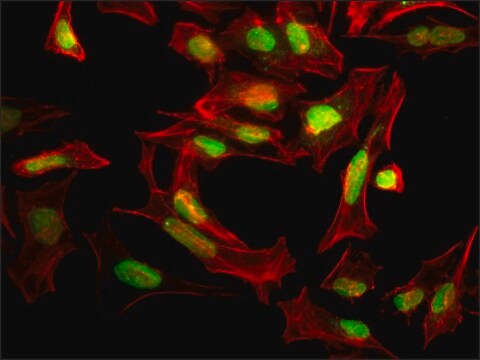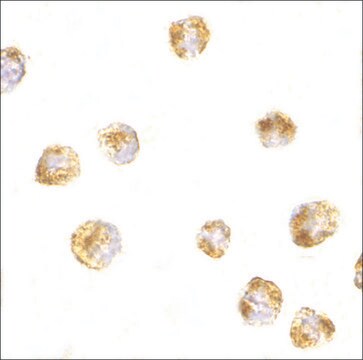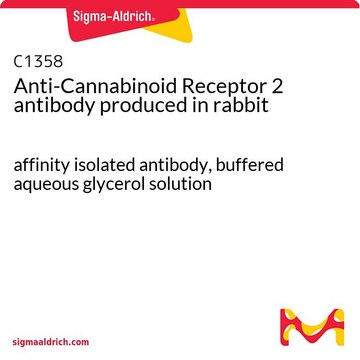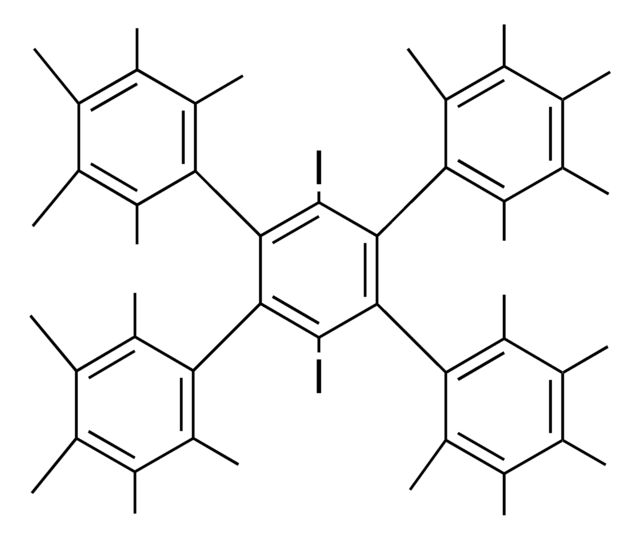推荐产品
生物源
rabbit
品質等級
共軛
unconjugated
抗體表格
affinity isolated antibody
抗體產品種類
primary antibodies
無性繁殖
polyclonal
形狀
buffered aqueous solution
分子量
antigen 14 kDa
物種活性
human
技術
microarray: suitable
western blot: 1-2 μg/mL using nuclear extract of the human epitheloid carcinoma HeLa cell line
UniProt登錄號
運輸包裝
dry ice
儲存溫度
−20°C
目標翻譯後修改
unmodified
基因資訊
cow ... SUMO1(614967)
human ... SUMO1(7341)
mouse ... Sumo1(22218)
rat ... Sumo1(301442)
一般說明
Small ubiquitin-related modifier 1 (SUMO-1) is a highly conserved small ubiquitin-related modifier, also known as sentrin. SUMO-1 gene is mapped to human chromosome 2q33.1.
特異性
Anti-SUMO-1 (C-terminal) recognizes unconjugated SUMO-1 (14 kDa), SUMO-1-fusion protein, as well as proteins covalently conjugated to SUMO-1, eg. RanGAP1, 90kDa
免疫原
synthetic peptide corresponding to amino acids 86-97 located at the C-terminus of human SUMO-1, conjugated to KLH. This sequence is identical in many species including rat, mouse, bovine, chicken, and Xenopus, and highly conserved (single amino acid substitution) in C. elegans SMT3. The sequence has only 66% homology to human SUMO-2 and SUMO-3.
應用
Anti-SUMO-1 (C-terminal) antibody produced in rabbit has been used in immunoblotting.
生化/生理作用
Small ubiquitin-related modifier 1 (SUMO-1) is covalently conjugated to the lysine side in proteins through its C-terminal glycine residue by an isopeptide bond. Their conjugation with cellular proteins has been correlated wide variety of biological processes including inflammation, oncogenesis nuclear transport, cell cycle control and viral infection response. SUMO-1 serves as a substrate for Ran GTPase-activating protein (RanGAP1). Unmodified RanGAP1 is present in the cytoplasm, suggesting that modification by SUMO-1 may target RanGAP1 to the nuclear pore complex (NPC). Haploinsufficiency in the SUMO-1 gene is implicated in the Cleft Lip and Palate.
外觀
Solution in 0.01 M phosphate buffered saline, pH 7.4, containing 1% bovine serum albumin and 15 mM sodium azide.
儲存和穩定性
For continuous use, store at 2-8 °C for up to one month. For extended storage, freeze in working aliquots. Repeated freezing and thawing, or storage in “frost-free” freezers, is not recommended. If slight turbidity occurs upon prolonged storage, clarify the solution by centrifugation before use. Working dilutions should be discarded if not used within 12 hours.
免責聲明
Unless otherwise stated in our catalog or other company documentation accompanying the product(s), our products are intended for research use only and are not to be used for any other purpose, which includes but is not limited to, unauthorized commercial uses, in vitro diagnostic uses, ex vivo or in vivo therapeutic uses or any type of consumption or application to humans or animals.
未找到合适的产品?
试试我们的产品选型工具.
Aleksandra Fergin et al.
PLoS genetics, 18(6), e1009978-e1009978 (2022-06-07)
The sumoylation (SUMO) pathway is involved in a variety of processes during C. elegans development, such as gonadal and vulval fate specification, cell cycle progression and maintenance of chromosome structure. The ubiquitous expression and pleiotropic effects have made it difficult
Jocelyn Widagdo et al.
PloS one, 7(11), e49283-e49283 (2012-11-13)
GTF2IRD1 is one of the genes implicated in Williams-Beuren syndrome, a disease caused by haploinsufficiency of certain dosage-sensitive genes within a hemizygous microdeletion of chromosome 7. GTF2IRD1 is a prime candidate for some of the major features of the disease
Xiuling Li et al.
Development (Cambridge, England), 139(23), 4321-4329 (2012-11-08)
In vertebrates, establishment of the hematopoietic stem/progenitor cell (HSPC) pool involves mobilization of these cells in successive developmental hematopoietic niches. In zebrafish, HSPCs originate from the ventral wall of the dorsal aorta (VDA), the equivalent of the mammalian aorta-gonad-mesonephros (AGM).
我们的科学家团队拥有各种研究领域经验,包括生命科学、材料科学、化学合成、色谱、分析及许多其他领域.
联系技术服务部门







